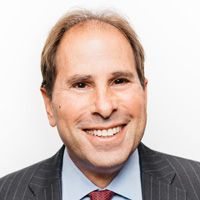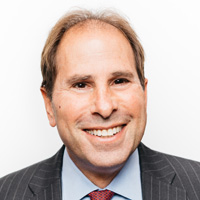Lessons Learned From Three Decades of Investing
What separates the best investors from the rest?


Profit and prosper with the best of Kiplinger's advice on investing, taxes, retirement, personal finance and much more. Delivered daily. Enter your email in the box and click Sign Me Up.
You are now subscribed
Your newsletter sign-up was successful
Want to add more newsletters?

Delivered daily
Kiplinger Today
Profit and prosper with the best of Kiplinger's advice on investing, taxes, retirement, personal finance and much more delivered daily. Smart money moves start here.

Sent five days a week
Kiplinger A Step Ahead
Get practical help to make better financial decisions in your everyday life, from spending to savings on top deals.

Delivered daily
Kiplinger Closing Bell
Get today's biggest financial and investing headlines delivered to your inbox every day the U.S. stock market is open.

Sent twice a week
Kiplinger Adviser Intel
Financial pros across the country share best practices and fresh tactics to preserve and grow your wealth.

Delivered weekly
Kiplinger Tax Tips
Trim your federal and state tax bills with practical tax-planning and tax-cutting strategies.

Sent twice a week
Kiplinger Retirement Tips
Your twice-a-week guide to planning and enjoying a financially secure and richly rewarding retirement

Sent bimonthly.
Kiplinger Adviser Angle
Insights for advisers, wealth managers and other financial professionals.

Sent twice a week
Kiplinger Investing Weekly
Your twice-a-week roundup of promising stocks, funds, companies and industries you should consider, ones you should avoid, and why.

Sent weekly for six weeks
Kiplinger Invest for Retirement
Your step-by-step six-part series on how to invest for retirement, from devising a successful strategy to exactly which investments to choose.
All investors will experience their share of success and failure. The market doesn’t play favorites. So what separates the best investors from the rest? It’s the lessons we learn along the way and how we apply them going forward.
Following are some of my top takeaways from three decades of investing:
'When the facts change, I change my mind'
This quote, often attributed to John Maynard Keynes (though he likely didn’t say it), is a reminder of the importance of adapting to changing circumstances. For example, in January the consensus forecast was that the Fed would cut rates six times during the year. That forecast was predicated by an economic outlook featuring slower growth, rising unemployment and inflation falling closer to the Fed’s 2% target.
From just $107.88 $24.99 for Kiplinger Personal Finance
Become a smarter, better informed investor. Subscribe from just $107.88 $24.99, plus get up to 4 Special Issues

Sign up for Kiplinger’s Free Newsletters
Profit and prosper with the best of expert advice on investing, taxes, retirement, personal finance and more - straight to your e-mail.
Profit and prosper with the best of expert advice - straight to your e-mail.
However, the facts supporting the start-of-year consensus changed, with economic growth, employment and inflation all meaningfully higher than expected, making it less likely that the Fed would cut interest rates aggressively in 2024.
Some investors were faster to adapt to the changing environment, revising their forecasts and portfolio positioning accordingly. Investors who stubbornly clung to the hope of rate cuts were slower to adjust their expectations, with negative portfolio consequences.
Reaching for yield is usually a bad idea
In a meeting early in my career, a corporate CFO questioned the logic of risking his career to seek a quarter-percent higher yield on the company’s short-term investments. That simply stated advice has stayed with me, as I’ve seen investors lose money by taking unnecessary risks to gain a relatively small amount of incremental yield. The low-yield environment made it particularly tempting to reach for yield in the years following the global financial crisis.
Higher-yielding investments may have a portfolio role, but investors should do their homework to assess the viability of bond coupon payments and principal repayment before investing. Equity investors seeking dividend yield should do similar work, evaluating the sustainability of current dividend payments (which are not guaranteed) and the valuation for the stock and the prospects for growth.
Don’t blindly follow someone else's investment ideas
I worked for a firm in the 1990s that invested in many privatizations of government-owned companies outside the United States. In reviewing a privatization of a telecommunications company, we identified multiple investment red flags, including shortcomings in corporate governance structure, problematic related-party transactions and an unstable regulatory framework.
The firm’s analyst proposing the investment dismissed our concerns, citing the involvement of a prominent investor as validation of the privatization opportunity. The prominent investor, however, had more favorable deal terms, including a far lower acquisition price and preferential liquidity terms. The prominent investor took far less of a loss a few years later when the stock price of the telecommunication company collapsed.
It can be tempting to invest based on cocktail party chatter, memes or social media posts, but the odds of sustainable investment success are low for investors who blindly follow others.
It pays to think about what could go wrong
Most investors focus on the positives when researching a new investment idea, creating a thesis around what they expect to happen with the stock. I’ve spoken with legendary investors who balanced the inherent optimism of that approach with the use of an investment “pre-mortem” before buying new stocks.
In a pre-mortem, the investor assumes that at a predetermined future date, an investment will have become a failure. The investor uses the pre-mortem to identify reasons why the decision might not work, which can help identify potential flaws in the investment thesis or future signals that would reveal signs of trouble for the investment.
Investors who allow for the possibility of failure will be better equipped to avoid making bad investments, or to more quickly identify when an investment isn’t working and should be sold.
Seek those who have advice on how to be a better investor
The airwaves and bookshelves are filled with advisors discussing what investors should think, or sharing tales of investment success. Investors may learn more from those who offer advice on how to become a better investor. My thinking about investments has been influenced by thought leaders such as Howard Marks, Warren Buffett, Daniel Kahneman, Michael Mauboussin, Seth Klarman and Philip Tetlock. Seeking insight into how to invest is likely a more productive endeavor than listening to war stories about someone’s recent investment win.
Investing is a continuous learning process, and this is by no means a complete list. That being said, I hope these lessons from my own experiences provide some practical guideposts as you proceed through your investment journey.
Related Content
- New to Investing? Six Expert Tips for How to Do It Smartly
- Five Tips for Level-Headed Investing in 2024 and Beyond
- Investing Mistakes Beginners Make and How To Avoid Them
- Best Investing Moves to Make Before the End of the Year
Registration with any regulatory body should not be construed as an endorsement or an indicator of investment skill, acumen or experience. Investments in securities are not insured, protected, or guaranteed and may result in loss of income and/or principal. Unless stated otherwise, any mention of specific securities or investments is for hypothetical and illustrative purposes only. Adviser’s clients may or may not hold the securities discussed in their portfolios. Adviser makes no representations that any of the securities discussed have been or will be profitable.
Profit and prosper with the best of Kiplinger's advice on investing, taxes, retirement, personal finance and much more. Delivered daily. Enter your email in the box and click Sign Me Up.

Daniel S. Kern, CFA®, CFP®, chief investment officer of Nixon Peabody Trust Company, is responsible for overseeing the firm’s investment process, research activities and portfolio strategy. He previously was the managing director and chief investment officer of TFC Financial Management. Earlier in his career, Dan was head of asset allocation at Charles Schwab Investment Management and managed global and international equity portfolios for Montgomery Asset Management. He is a contributor to TheStreet.com and ThinkAdvisor.com and a regular guest on Bloomberg’s Baystate Business and TD Ameritrade Network.
-
 Dow Leads in Mixed Session on Amgen Earnings: Stock Market Today
Dow Leads in Mixed Session on Amgen Earnings: Stock Market TodayThe rest of Wall Street struggled as Advanced Micro Devices earnings caused a chip-stock sell-off.
-
 How to Watch the 2026 Winter Olympics Without Overpaying
How to Watch the 2026 Winter Olympics Without OverpayingHere’s how to stream the 2026 Winter Olympics live, including low-cost viewing options, Peacock access and ways to catch your favorite athletes and events from anywhere.
-
 Here’s How to Stream the Super Bowl for Less
Here’s How to Stream the Super Bowl for LessWe'll show you the least expensive ways to stream football's biggest event.